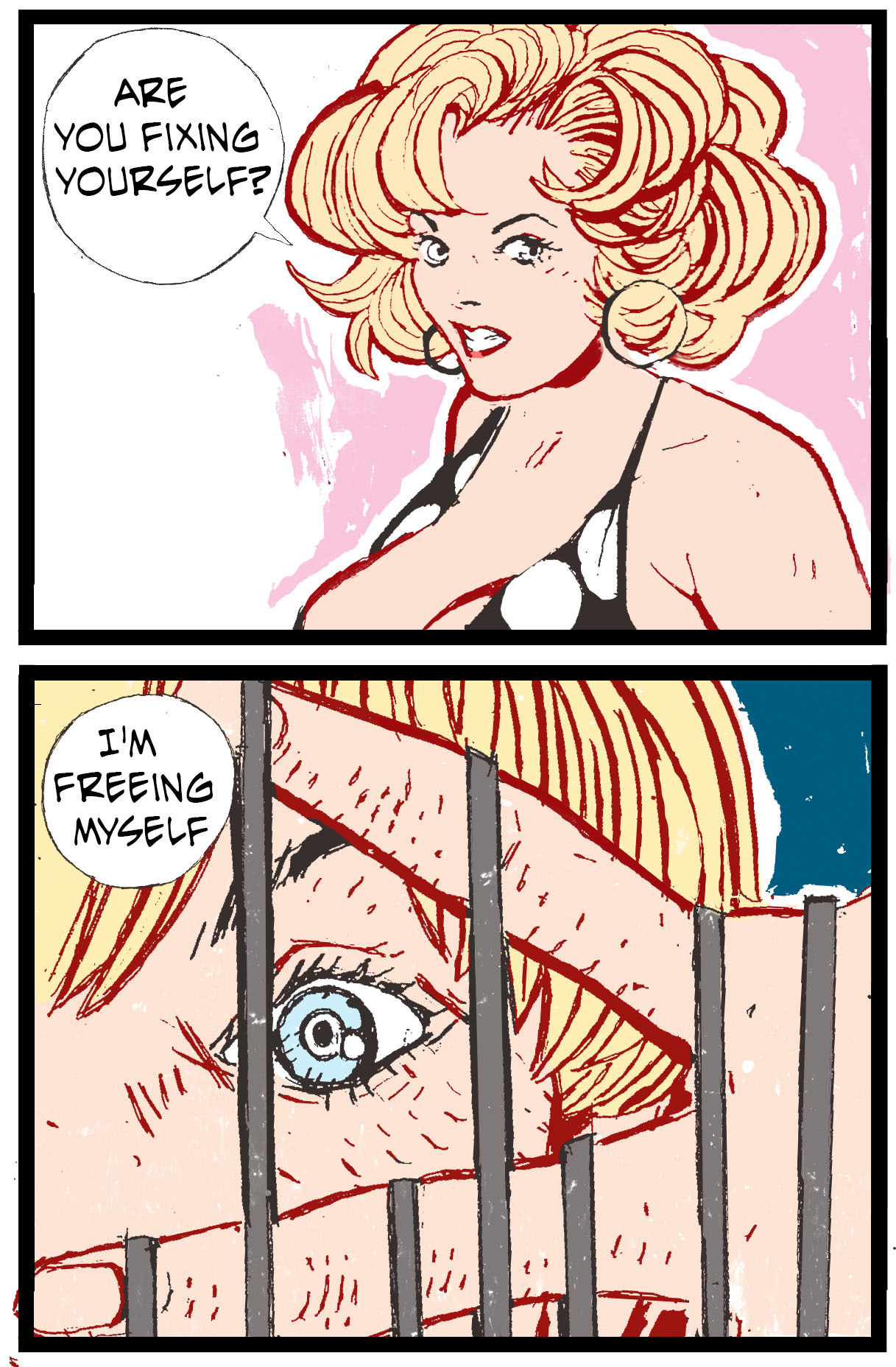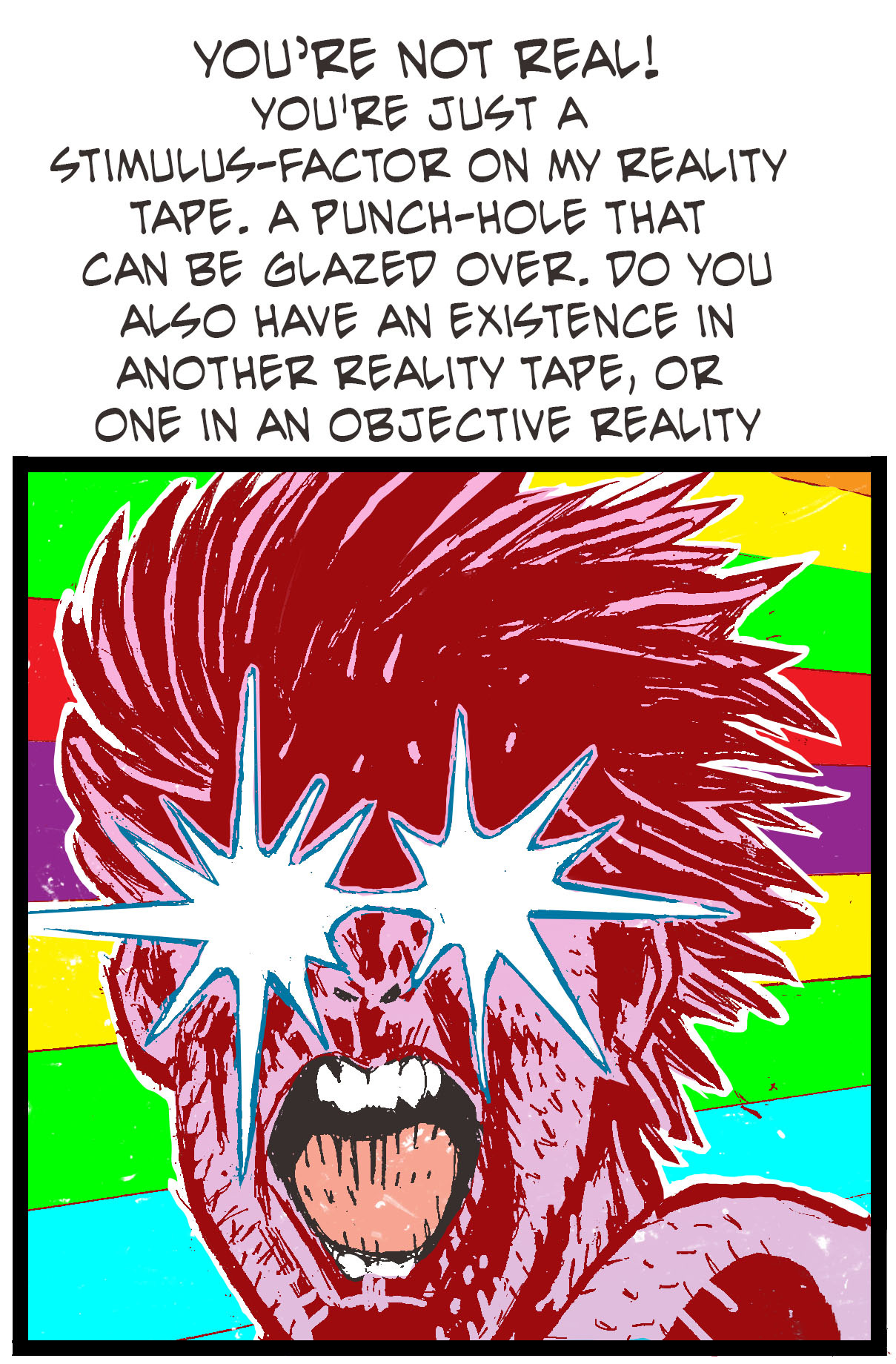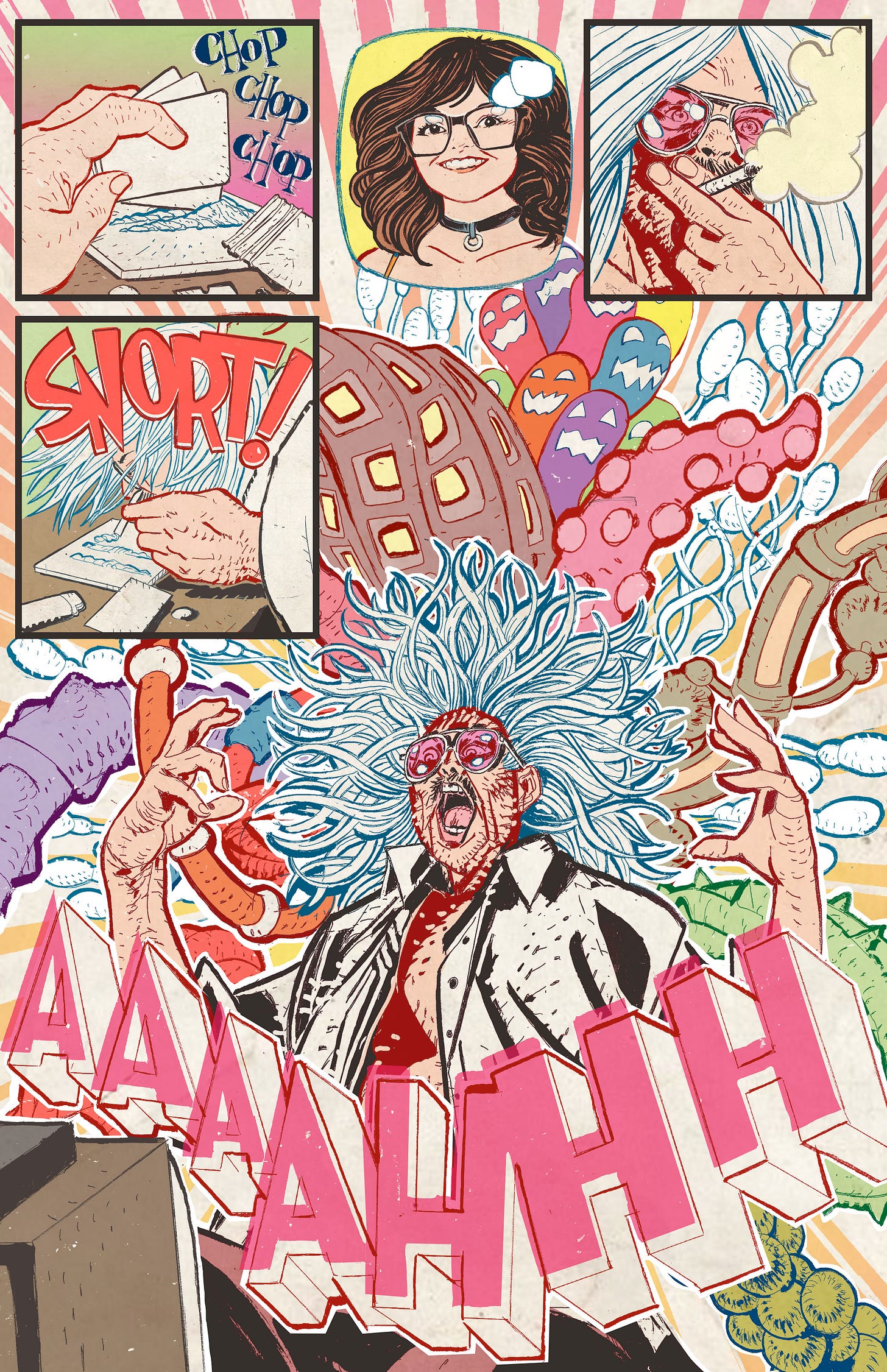I often listen to audio books while I’m working. Sometime about two years ago I listened to an audio version of Philip K Dick’s 1969 short story “The Electric Ant” on Youtube and had what could best be described as a manic episode. Where I was hit by a sudden burst of inspiration and stayed up the entire night laying out an comic adaption of the story in a mini-comic zine format, copying and pasting the dialog from Dick’s story into blank panels of a comic.
I stayed up until almost noon the next day, but by the time I finally crashed I had the lettering and panels for the entire thing laid out.
I had it all conceptualized on the page. now it was just a matter of finding the time to draw the thing.
It wasn’t until a year later while I was waiting for some things to come through so I could launch the Kickstarter campaign for my book, EVIL Comics. I had made all the edits I wanted for the book was finally ready to go to the printers, and for the first time in years found myself not having a comic project I was in the middle of chipping away at.
So I turned my attention to the Electric Ant comic I had laid out over a year earlier. Finally ready to fill up it’s blank panels.
I managed to blast through drawing the artwork relatively quickly by my standards and was able to include the finished zine as a bonus stretch goal and add-on to the EVIL Comics Kickstarter campaign.
The Electric Ant is a story about Garson Poole, a CEO at Tri-Plan Electrics. Poole wakes up in the hospital after a flying car accident and is informed by the doctor that he is not human but rather he is actually an Electric Ant. A kind of “organic robot”
.
The Doctors then proceed to kick him out of the hospital, because hospitals are for people, not robots posing as human.
Poole experiences an existential crisis realizing his entire existence is a lie and all his memories were false. A mere robotic puppet to act out the actual owners of Tri-Plan Electric’s will.
Poole discovers that there is spool of electric tape that is housed within his chest that contains all the information that makes up the entity known as Garson Poole on it.
He begins to play around with the tape. Attempting to manipulate and alter it.
Rationalizing if he can alter the tape Poole can alter his reality.
After all, every thought, every memories, everything Garson Poole has ever known or will know is contained on the tape. The tape in essence is the entirety of Poole’s subjective reality.
Electric tape being the very peak of computing technology in 1969 when Dick wrote the story. Today it reads as a quaint anachronism that gives the short story it’s charm.
Of course when a person like me, who was born in the mid 1980’s hears “electric tape” my mind immediately thinks of the compact audio cassette tapes I grew up with.
I think the mental image of a man with a audio cassette tape lodged in their chest was originally the thing that took hold of my imagination and inspired me adapt the story in the first place. Something about that image resonated with me.
In the end it turns out trying to mess around with the tape is a bad idea and doesn’t produce the desired results Mr. Poole was hoping for, and the situation quickly spins out of his control.
Originally appearing in the October 1969 edition of Fantasy and Science Fiction Magazine, Electric Ant is one of Dick’s later short stories. Having spent the earlier part of his career in the 50’s predominantly writing short fiction, by 1969 nearly all of the pulp science fiction magazines Dick’s early short stories had appeared in had all but completely vanished.
Dick had begun transitioning over to writing full length novels by the mid-1950’s and by 1969 he had already written many of his more acclaimed books( Ubick, Three Stigmata of Palmer Eldritch, Do Androids Dream of Electric Sheep, Man in the High Castle) So Electric Ant is unusual for the time, as he wasn’t writing much short fiction.
The Electric Ant has many of Dick’s common themes. Ideas surrounding identity, paranoia and characters questioning their perceptions of reality. Making it a good entrance point for the uninitiated into the world of PKD.
While just about every line of dialog and narration that appears in my comic adaption was copy and pasted directly from the original text, I did take some liberties shorting and combining certain scenes and changing the order they appeared in.
The biggest change I made was to the ending. Adding an extra story beat connecting the climax to the flying car crash from the beginning of the story that landed Poole in the hospital and acted as the stories off screen inciting incident.
I made the changes to the ending with the intent of turning the story into having a Ouroboros type structure. that looped in on itself.
Very curious to hear from people who have read both the original short story and my comic adaption thought of my changes to the ending.
Please sound off in the comments if you have read both.
Did you like the changes or am I blaspheming for changing Dick’s work?
Check out this Youtube review of my Adaptation of The Electric Ant.
If you’d like a copy of my comic adaption of The Electric Ant. I still have copies available.
I’ve been selling them with a special deal I’ve been running packaging copies of my books Pissant Apocalypse and EVIL along with zine copies of the Electric Ant and a short collection of my nude figure drawings and a commission drawing of whatever you wanted for $125.
I received a lot of feed back about my previous 3 posts about my unfinished comic project “Mr. Shadow’s Dark Life” regretting not taking advantage of my $50 commissions when they had the chance.
So with that in mind I’m announcing the return of my $50 Commissions! Contact me through my email jamesedwardclark@gmail.com and let me know what you would like me to draw for you and I will send you the original drawing along with a copy of The Electric Ant!
Philip K Dick is perhaps my favourite writer. While I haven’t read all his books (He wrote something like 44 of them) I have read a big chunk of them and I thought it be fun to leave you with my top ten PKD books.
#1 Three Stigmata of Palmer Eldritch-
Maybe the most PKDish of all of PKD’s books. It straddles the line of Dick’s pulpy roots and his more high minded notions of reality and, alternate dimensions, benevolent god-like beings toying with the lives of ordinary people caught in their cross hairs.
Completely unhinged and off the wall, throwing a million ideas at you a minute , while still holding together surprisingly well.
A wild ride from beginning to end.
On a meta level it represents the start of Dick’s real life decent into madness.
The story being inspired by an incident where Phil saw a menacing face in the sky after heading home from his little writing hovel after one of his amphetamine fuelled writing marathons.
#2 VALIS-
If Palmer Eldritch represents the start of Dick’s metal fracturing VALIS is the ultimate culmination of that decline.
PKD wrote VALIS in an attempt to dramatize his experience he had with the alien satellite that Dick believed was orbited the Earth and was beaming information directly into his brain in the form of pink rays of light.
Dick having claimed to received many visions over the years from this satellite, which he called “Vast Active Living Intelligence System” or “VALIS” for short, including a vision warning him that his new born son had a undetected medical condition.
Dick would spend the rest of his life crediting that vision for saving his sons life.
The book weaves autobiographical details in with a satirical portrayal of Dick’s own schizophrenia through the character of “Horse Lover Fat” (Philip= Lover of Horses in Latin, Dick= Fat in German) a second alternate version of Dick’s fractured identity who the real Phil bounces his insane ideas about what is really going on back and forth with.
The final third of the book descends into almost complete incomprehensible schizophrenic ramblings as Dick abandons the story he was telling in exchange for copying and pasting passages from his ten thousand page manifesto he spent most of his free time during the last decade of his life writing trying to make sense of the religious visions VALIS was supposedly feeding him, that he called his “Exegesis”.
#3 UBIK-
Another of PKD’s pulpier books that bends the readers perception of life, death and the reality of human existence.
Best remembered for being the book about God in a spray can.
UBIK is a tough book to sum up in a short blurb, it’s really a book that just needs to be experienced for yourself.
#4 - Scanner Darkly-
A giant leap in Dick’s writing from a lot of his earlier books
It pulls heavily from his own experience in the underground California drug scene Phil fell into after his forth divorce.
While most of PKD’s books were hammered out at breakneck pulp speed while completely whacked out of his mind on amphetamines with barely a second draft even attempted. Dick really took his time on this one. perfecting the dialog and characters, and it shows.
The Richard Linklater animated adaptation is actually very close to the original book. and it might spoil the experience of reading the book if you decide to watch the movie first.
#5- Do Androids Dream of Electric Sheep-
The book Blade Runner was based on. Probably PKD’s most well known book.
While Scanner Darkly was very faithfully adapted to the screen in its film version. Blade Runner bears almost no resemblance to the book it was based on, with the exception to a few base concepts and conversations lifted directly from the text. And once you read the book you’ll understand why.
Much of Electric Sheep would be unfilmable even today. With a whole sub plot about a new future religion acting as the backbone of the book no where to be found in Blade Runner.
#6- Man In The High Castle-
One of Dick’s earliest successes that help establish him as a writer, Man in the High Castle won a bunch of awards and acclaim upon its release. Telling the story of an alternate history where the NAZI’s and Japan won World War 2.
It stands out as being a lot more thoughtful and slower paced with much more emphasis on character compared to his other works, particularly for that point in his career.
#7- Galactic Pot Healer-
Entering the “B” tier of Dick’s work now.
Galactic Pot Healer is one of Dicks quirkier novels. About the last Pot Healer(a person who repairs pots) in the world who when we meet him is wasting away on Earth, which has a fallen into a failed totalitarian socialist bureaucracy with hyper inflation and no pots that need fixing.
Our protagonist is lifted out of his day to day drudgery by a fantastic god-like being who wants to start a new perfect society on another planet, and he needs a pot healer to go along with that perfect society.
Pot Healer has some of Dicks most biting and funny social commentary.
#8- Martian Time Slip-
Sorta small town domestic drama that could almost have been set on Earth with all the sci-fi elements stripped out. But just so happens to take place on Mars instead.
#9 -Flow My Tears The Police Man Said-
Dick swaps out his usual feckless every man schlub self-insert protagonist for a handsome successful famous television super star whose life is turned upside down when he wakes up and finds his identity and any memory of him among the population and been stripped away and must navigate the totalitarian police state the story is set in to figure out what happened and who he really is.
#10- The Transmigration of Timothy Archer-
Published after Dick’s death.
This last PDK novel tells a fictionalize account of Phil’s relationship with the controversial Episcopal bishop James Pike, who was removed as the Bishop of California for heresy. It acts as a good counter balance to the insanity of VALIS.
Thank you for reading this far.
Next week: If you thought Mr. Shadow’s Dark Life was pornographic? That was nothing compared to the time I tried to make a book literally about a porn star.
It’s JEC’s lost covid era Boogy Nights, next week! As we go over….
“If These Balls Could Talk”!
.
-James














Thanks for sharing that with us. You did a good job of adapting Dick's short story to the comic medium. I wonder if you would consider adapting some other Dick stories, like The Father Thing, or The Hanging Stranger.
I like that you gave a nod to Galactic Pot Healer in your recommendations. This book has grown in my estimation over the years. I like it more now than I did when I first read in back in the 70's.